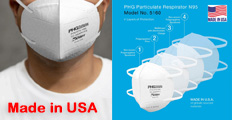



Find all of your laboratory and workplace safety supplies at Safety Emporium!
 Vesicant |
 Glossary Index |
 VOC |
| MSDS Topics |
Free Sites | FAQ's | Regulations | Glossary | Software | Suppliers |
| Books | Forum | Poll | Fun stuff | Quiz | Store | |
| Understand your MSDS with the MS-Demystifier | Search ALL our MSDS info | |||||
Viscosity is a measure of a fluid's resistance to flow.
Do not confuse the term viscous with vicious (mean and nasty!).
Liquids such as molasses or motor oil are examples of highly viscous substances. The viscosity of a liquid generally decreases as the temperature is increased. For example, warm molasses is easier to pour and stir than cold molasses because it has a lower viscosity when warm.
Two common units of viscosity are the poise which is 1 dyne per second per square centimeter and the centipoise (100 centipoise = 1 poise). These can also be expressed as (Newton)(second) per square meter.
Gases also have a resistance to flow, although these viscosities are much lower than for liquids.
When selecting a stirring motor for use with viscous liquids, one generally needs to purchase a unit that has a geared motor that provides the necessary torque. Safety Emporium has a link to a handy selection chart on its HST20 Series Stir Tester page.
Safety Data Sheets are required to list physical properties such as viscosity (if known and/or relevant) in Section 9 (physical and chemical properties).
Viscous materials pour slowly and may be difficult to stir. In general, the viscosity of a syrupy material tends to decrease as the temperature increases. Your workplace procedures for the handling and transfer of viscous materials may require you to heat them, producing and entirely new set of thermal hazards.

Get your US-manufactured NIOSH-approved N95 surgical respirators and more from Safety Emporium.
See also: area units.
Additional definitions from Google and OneLook.
Entry last updated: Sunday, February 6, 2022. This page is copyright 2000-2025 by ILPI. Unauthorized duplication or posting on other web sites is expressly prohibited. Send suggestions, comments, and new entry desires (include the URL if applicable) to us by email.
Disclaimer: The information contained herein is believed to be true and accurate, however ILPI makes no guarantees concerning the veracity of any statement. Use of any information on this page is at the reader's own risk. ILPI strongly encourages the reader to consult the appropriate local, state and federal agencies concerning the matters discussed herein.